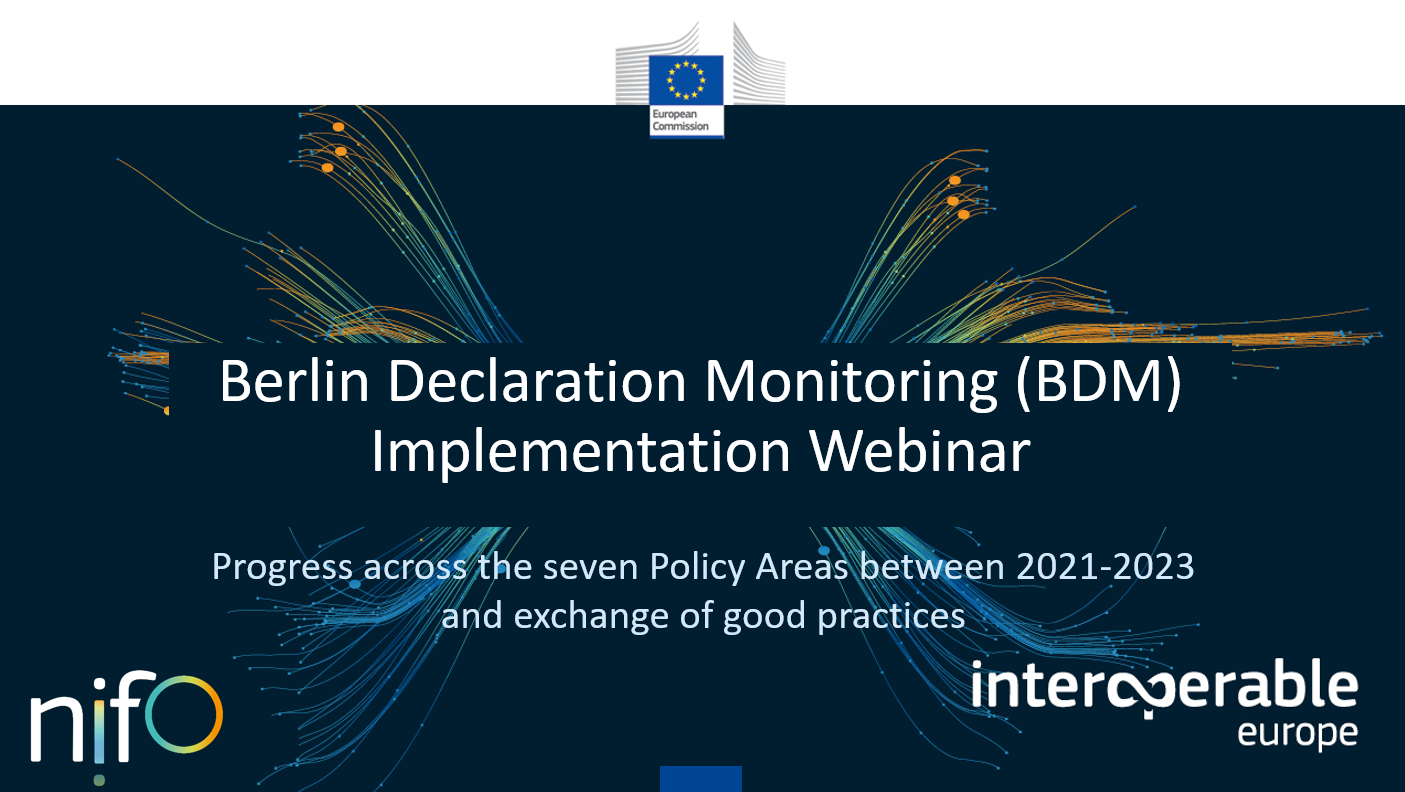
On 24 July, the European Commission, through NIFO, organised a webinar on the implementation of the Berlin Declaration Monitoring (BDM) mechanism. It was attended by more than 20 participants, and it was the opportunity to take stock of the results over the three years (2021-2023) of its implementation, as well as reflect on the possible next steps. Additionally, Finland had the chance to display national good practices related to Policy Area 6 on the creation of value-based, human-centred AI systems for use in the public sector.
BDM: overview of the results at EU level between 2021 and 2023
During the webinar, the NIFO team provided an overview of the BDM, a commonly agreed set of 22 Policy Actions to be implemented by all EU Member States by 2024. The mechanism assesses the level of implementation of these Policy Actions, which are grouped into 7 Policy Areas aligned with the 7 Principles set out by the Declaration. More information can be found here.
It was possible to see that since the establishment of the monitoring mechanism in 2021, all Policy Areas have shown positive development, underlying the strong commitment of Member States to meet the objectives set forth by the Berlin Declaration. However, Policy Areas have progressed at different paces and could then be grouped into three clusters based on the increase of their progress percentage between 2021 and 2023:
Cluster 1 – High Progress (More than 7% progress since 2021)
-
Policy Area 1: +9%
-
Policy Area 4: +9%
Cluster 2 – Medium Progress (Progress between 5% and 7% since 2021)
-
Policy Area 5: +7%
-
Policy Area 3: +5%
-
Policy Area 7: +5%
Cluster 3 – Low Progress (Less than 5% progress since 2021)
-
Policy Area 2: +4%
Further explanation on the results, including the datasets, are available in the third and last BDM progress report, which provides, apart from the overview of the results, a historical perspective of the progress made since 2021 (2021-2023), as well as an assessment of the overall performance of Member States (EU average) under each Policy Action over this timeframe.
Exchange of good practices with Finland on Policy Area 6
Finland shared its advancements regarding Policy Area 6, which puts emphasis on opportunities deriving from innovative technologies, including Artificial Intelligence (AI) systems. Such systems should be strengthened at the EU level to ensure they are secure and trustworthy. At the same time, they hold great potential for evidence-based policymaking and play a key role in providing user-centric public services.
Riitta Autere (Ministerial Adviser, Ministry of Finance) pointed out the usefulness of the BDM in the design of guidelines and regulations on AI and automatic decision-making. For instance, to support the Finnish Tax Administration's work, automation has been used extensively to improve efficiency. In May 2023, Finland introduced a legislation allowing decisions to be made automatically in public administrations, including the Tax Administration. Automation, in fact, enables simple decisions to be made instantly, potentially saving thousands of man-years of work annually. This regulation assures conformity of automatic decision-making with national legal requirements, especially regarding the following principles:
-
Accountability;
-
Transparency;
-
Predictability; and
-
Right of review and non-discrimination that are based on pre-existing law.
Finland also showcased the challenges of using AI systems in conformity with national legal requirements, such as balancing the need for accountability with autonomy, transparency with black boxes and trade secrets, and predictability with statistical models. Moreover, some topics still require stronger promotion, including interoperability at all levels, digital-ready/friendly legislation, and scalable services and solutions.
To overcome these barriers, it is necessary to have a shared vision, as described by Finland's Digital Compass Strategy, in order to create the conditions for steering and implementing the development package for digitalisation. Likewise, it is important to launch specific programmes, such as the one promoting life event-based digitalisation, which combines a human-centric approach with the promotion of interoperability, always considering the economic impact.
Feedback on the BDM exercise and final remarks
In the last part of the webinar, the NIFO team launched a short survey to capture Member States' feedback and thoughts on the BDM exercise. Overall, Member States highlighted that implementing the 7 Principles of the Berlin Declaration has been a value-adding but challenging experience, especially with regard to Policy Area 5 (Strengthen Europe’s digital sovereignty and interoperability) and Policy Area 2 (Enhance social participation and inclusion). When asked for suggestions on improving the monitoring process, they mentioned the need to avoid overlapping with other monitoring efforts undertaken at the EU level, and to provide good practice examples at both Policy Area/Action level and KPI one, among others.
To conclude the event, Claudia Oliveira (DG DIGIT) emphasised that the third and last progress report has been enriched with qualitative stories from each Member State to boost knowledge sharing and experience exchange. Moreover, she highlighted that the Berlin Declaration’s objectives do not have to end here and invited everyone to follow closely future updates at the national and EU levels.
The presentation shared during the webinar is available below.

